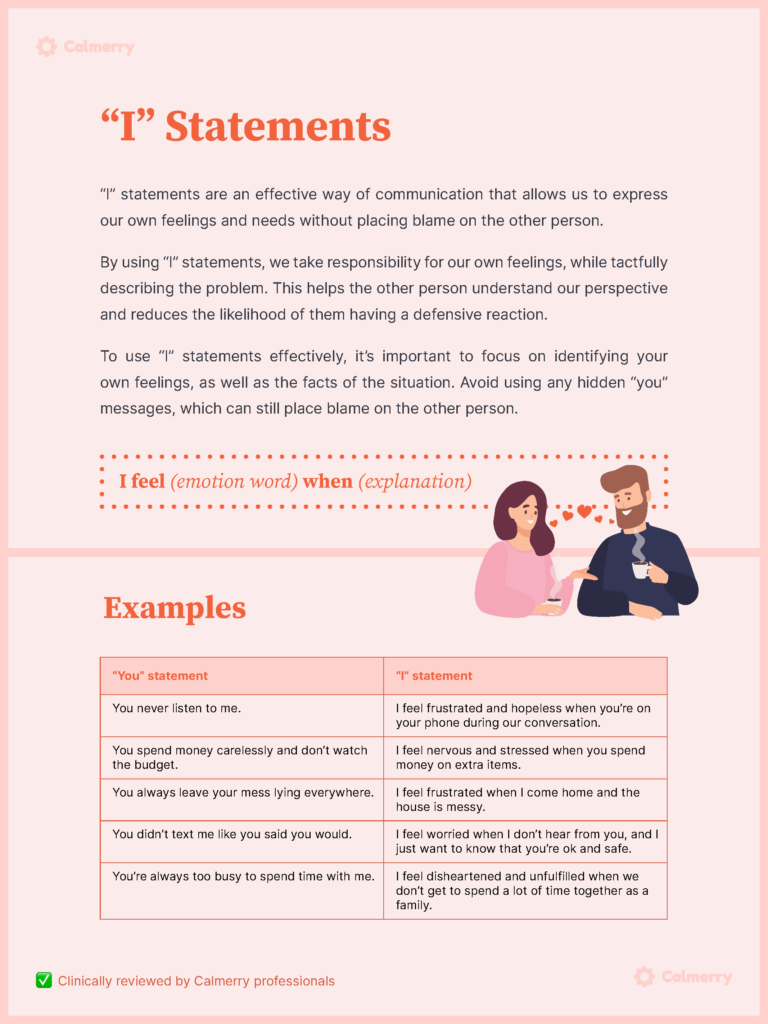9 Ways to Improve Communication in Your Relationship

In this article
Communication is key to a harmonious and healthy relationship. All too often, couples have difficulty expressing how they feel, which can lead to misunderstandings, disagreements, and even toxic behaviors.
Understanding how to improve communication with your partner is not only helpful for those whose relationship is under strain – it can protect an otherwise healthy relationship from problems later on, too.
In this article, we will cover the 9 core ways to ensure healthy communication in relationships.
Why do couples need to communicate?
Even the most solid relationship will be put under stress at some stage. Researchers have found that conflict arises between intimate partners when there is a discrepancy in power, financial hardship, or a disagreement about intimacy, the amount of time spent together or domestic responsibilities.
Managing the source of conflict can be difficult, adding to the stress each partner is under. Resolving difficulties requires good communication skills and the ability to express your feelings clearly, whilst still showing respect to your partner.

When you are both under pressure, being able to use effective communication skills is key to resolving the source of conflict without worsening the situation.
How to Improve Communication in a Relationship
When your partner does something that annoys, frustrates, or upsets you, it’s all too easy to slip into a state of anger, blame or even emotional manipulation. Although this might feel satisfying, these behaviors are likely to worsen your relationship rather than aid progress.
Following our 9 tips for healthy communication in relationships will help you not only in romantic relationships but with family, friends, and co-workers, too.
1. Process your feelings
Although it can be tempting to launch into an argument when your partner forgets to pick up milk or never does the laundry, it is best to slow down and pay attention to the root of your upset. Part of enhancing your portfolio of communication skills is learning to recognize what you are feeling, and why, so that you can explain this clearly to someone else.
Often, the issue is not the forgotten milk or laundry, but a deeper concern about feeling unsupported or disrespected. Pay attention to your emotions, and then try to communicate this with your partner.
2. Use “I”-statements
When conflict arises, it can be easy to make judgmental statements that can result in your partner responding with defensive communication. If you complain to your partner, “you never pick the children up from school”, they will likely retaliate by claiming that the opposite is true or by complaining about something that you never do.

Rather than assigning blame, it is better to explain how your partner’s actions make you feel. Clarify that when your partner doesn’t pick the children up from school, it puts you under additional pressure and makes you feel that he or she doesn’t appreciate you. Using an “I” statement avoids opening the door to unhealthy micro-disagreements.
“I” statements are an effective way of communicating our concerns, feelings, and needs without blaming others or sounding threatening. Using “I” statements helps us take responsibility for our feelings and tactfully describe the problem.
Download this 👉 “I”-Statements Worksheet that includes some tips and examples of “I” statements. Apply this technique in real-life situations.
3. Choose your time
Although you might feel incredibly frustrated with your partner, there are certain times when unhealthy communication patterns are more likely to emerge. Even when you are angry or upset, it is important that you respect your partner enough to wait for the right time to raise a concern.
Embarrassing your partner in front of their friends or calling them at work to discuss their faults is unlikely to lead to conflict resolution. Instead, you risk an intense argument.

If you need to have a difficult conversation, set time aside when you can both fully focus on each other. This may mean waiting until the evening, or arranging to go for a walk so that you can talk side by side. Sometimes talking away from your home can make conversations more productive.
4. Keep conversations going
When complex conflict arises, progress can seem slow. This is especially true if you reach a stalemate with neither of you willing to compromise. At this point, some couples sweep conflict under the carpet to avoid having to have the same conversation over and over.
However, ignoring problems long-term can lead to irritation and even weariness in your relationship. If something is bothering you on a regular basis, it is best to say what’s on your mind, rather than keeping your feelings bottled up.
5. Listen to your partner
When you communicate, it is vital to listen to your partner, rather than focusing on getting your side of the story out.

Active listening is a skill that can take some time to learn. As your partner talks, you may find it helpful to ask them to clarify what they mean. Checking that you properly understand what they’ve said by asking, “so what you mean is…” shows that you value and respect their feelings. Checking that you understand helps to prevent a misunderstanding, and showing empathy can diffuse difficult conversations.
When listening, be aware of the body language of you and your partner. Adopting an aggressive stance will make it more difficult for both of you to communicate fairly and honestly. Try to keep body language neutral, and ask your partner to do the same. This avoids feeling threatened or, conversely, assuming the more powerful position.
6. Be prepared to compromise
Part of successful communication is understanding that the end goal is to resolve the issue. You and your partner may have a different idea of what resolution looks like, but that doesn’t mean that only one of you is right.
A partner with a manipulative communication style may be able to persuade someone to bend to their will, but the other party will be left feeling downtrodden. Similarly, passive aggression may work at persuading someone to agree to something, but is likely to breed resentment between you.
Don’t assume your partner knows everything you expect in a relationship. Let them know. A relationship should be based n communication, not on assumptions. Consider what you are willing to compromise on, and discuss your feelings openly with your partner.
7. Respect boundaries
Each couple is likely to have a weak spot. If you often disagree about whether you get enough quality time together, consider putting a boundary in place to protect two evenings a week reserved for just the two of you.
If your partner threatens this boundary, consider whether you can accept their reasons. For example, if they are needed on an overnight business trip, you might show more compassion than if they make plans with their friends who could be seen on any other evening that week.
8. Practice
Like all skills, learning to communicate in a healthy manner takes time. By persevering in practicing good communication, your ability to express yourself, listen to your partner and decide where to compromise will improve.

It is also important to learn how and when to forgive a partner, friend or relative who has upset you or let you down. We all make mistakes, but being able to express how you feel and accept an apology is an important part of a long-term relationship.
9. Ask for professional help
Many people search for a therapist to assist them with communicating with their partner. Whether you seek help as an individual, or search for couples counseling, getting help from a professional can be a positive way to understand how both you and your partner are feeling.
Final thoughts
It is common to have difficulties communicating with your partner. And learning communication skills is vital to a long and happy relationship.
Healthy communication involves being able to express your feelings clearly and listen to your partner’s point of view. If you reach an impasse in communication, investing in online therapy is an excellent way to help you and your partner better understand each other’s viewpoints.
online therapy
live video session




